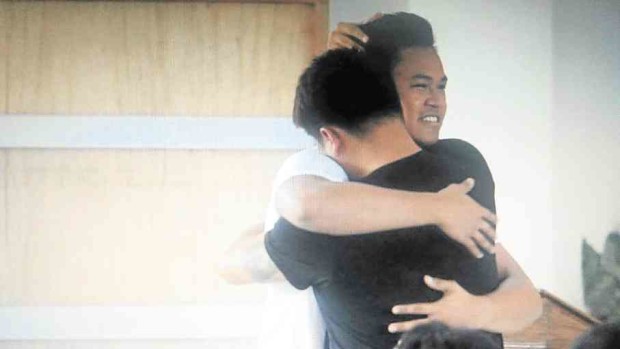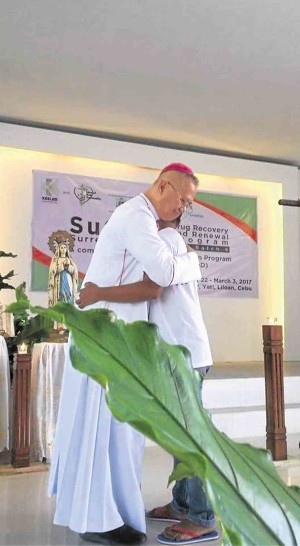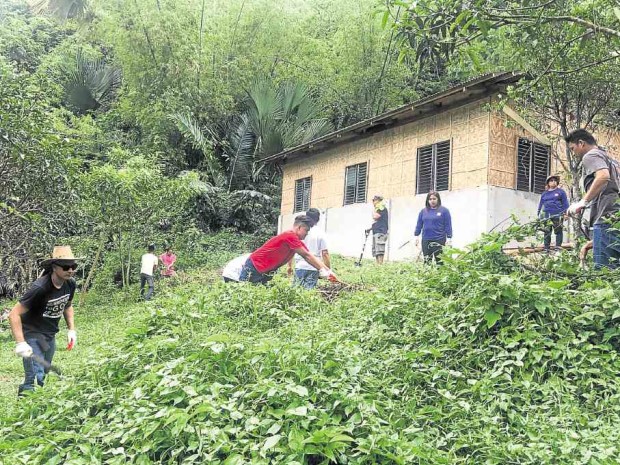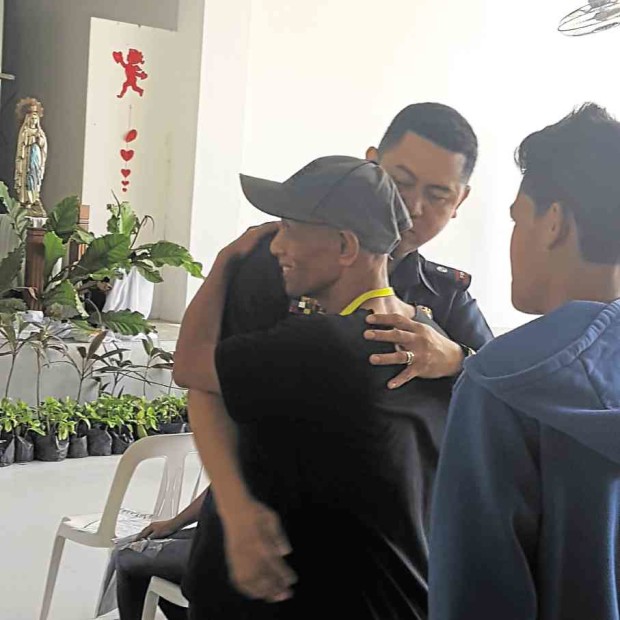Where ‘SuGod’ means retreat and surrender for drug users

ACCEPTANCE All new participants are welcomed with a hug and reassured that they will not be judged because of past mistakes. Photos by Cris Evert B. Lato
CEBU CITY — President Rodrigo Duterte had described them as zombies, drug addicts who are no longer human beings. In Mr. Duterte’s world, Ana (not her real name) should have been dead by now.
Ana was 15 when she got pregnant by an addict she had met in one of the many pot sessions that defined her life in February 2016.
She turned to drugs — “shabu” (methamphetamine hydrochloride) in particular — thinking them an escape from her problems, including the breakup of her parents, as a pusher/cousin had led her to believe.
But the drugs messed up her life even more: she had multiple boyfriends and pot sessions with different men.
Hope came through a neighbor who learned of Ana’s addiction, and introduced her to a drug recovery program called Surrender to God (SuGod).
Ana became part of the first batch of enrollees in SuGod in August 2016. It was here that she realized that the escape hatch offered by drugs was a mere hallucination.

SPIRITUAL ASPECTCebu Archbishop Jose Palma embraces a another enrolee of the Surrender to God program in Barangay Yati, Liloan, Cebu.
“The talks about what drugs can do to my body and the mistakes I’ve done against God and the people I love because of my addiction made me realize that using drugs was not worth it,” she said.
But quitting was difficult because some of her friends were addicts too.
Pregnancy provided the answer Ana had been waiting for.
“I’ve wanted to quit drugs but could not find a reason compelling enough to make me stop,” she said.
Non-threatening place
The 10-day community-based drug recovery and renewal program offered by SuGod combines scientific, educational and spiritual elements in a non-threatening and loving environment that encourages drug users to start living a clean life.
Since the SuGod program started in August 2016, at least 350 addicts have recovered from their addiction. Its next sessions are scheduled from March 28-April 6.
Fe Barino, who helped form SuGod, said she and husband Lito had no idea that the program would find relevance at the height of Mr. Duterte’s drug war.
The couple operated successful businesses in the construction and real estate sectors and are active members of the Love of God (LOG) Charismatic Community. SuGod’s current home is in LOG’s community center in Yati village, Liloan, northern Cebu province.
It was the Barinos’ company that built the 2,600 sqm International Eucharistic Congress pavilion.
Amid their businesses’ success, the Barinos felt there was something amiss and thought of checking on their workforce.
“Our company is ISO-certified,” said Fe. “We need to live up to the standards of this certification.”
Test results
Fe thought of doing a drug test among her workers, and enlisted the help of childhood friend, Rene Francisco, who runs a drug rehab center. He advised them to do the tests simultaneously in the Barinos’ offices and their construction sites.
The first test showed that 46 of their 300 employees were positive for drug use.
Instead of firing the employees, Fe asked Francisco to design a stay-out drug recovery program to help the workers quit the deadly vice. She had watched news about hundreds of addicts being killed even after they had surrendered to authorities.
“I felt this was a cry for help among God’s fallen children,” she said.
Fe spent at least P300,000 on the first session of SuGod for food, professional fees of recovery coaches and other miscellaneous items for the 78 participants. At least 65 of the 78 initial enrollees in the program have graduated.
SuGod is now being run by LOG, Francisco’s It Works Chemical Dependency Treatment Center and another group, the Kaalam Foundation Inc.

HALFWAY HOUSECurrently under construction, this house is where SuGod graduates will stay as they learn livelihood skills that will help them integrate back into society.
Help came
Since it started in August 2016, SuGod has received financial and technical support from different individuals and organizations, including those based abroad.
But Fe is just as aware of the program’s limitations.
“It is not an assurance that everyone who graduates will stop using drugs immediately,” Fe said.
“We have graduates who have a relapse after, but what we have created here is a support group that helps them in their battle against drug use,” she added.
SuGod graduates join a regular session at LOG center in Liloan where they are welcome to share their experiences in drug recovery and even relapse.
The graduates are also given skills and livelihood training to help them return to the community and become productive members of society.
Past SuGod graduates were trained in welding and bread and pastry making, while some served snacks at the sixth run of SuGod. Others found employment in the Barino couple’s company.
Francisco, a former addict himself, serves as speaker and facilitator of SuGod. He also trains other addicts to become recovery coaches.
Sick persons
“We teach them that they are not bad boys who need to become good boys,” Francisco said.
“We tell them that they are sick persons needing treatment,” he added.
The treatment combines cure, awareness and spirituality.
“We teach them how to help themselves,” said Francisco, who is also cofounder and program director of FARM-IT Works Balay Kahayag Chemical Dependency Treatment Center in Baclayon town, Bohol province.
Francisco said SuGod followed the 12 Steps Program of Recovery, a set of guidelines that drug users followed to overcome addiction.
SuGod soon became an inspiration for the Cebu archdiocese, the country’s biggest, to launch the Cebu Archdiocesan Program for Drug Dependents, which partnered with the police, village officials and other government agencies to help the drug dependents in Cebu.
Kaalam Foundation, which runs the LOG Center, has earmarked P5 million to support the Church program.
Fear of cops
During the initial SuGod sessions, the police were asked to stay away while the addicts shared their stories.
But not anymore. At the sixth run of SuGod, 60 participants warmly welcomed Chief Insp. Franco Rudolf Oriol, the police chief of Liloan town, who delivered a talk on the topic, “Rebels No More.”
Oriol, said Fe, “had explained that he could speak as a friend to the drug addicts, and that it could be part of healing their fear of men in uniform.”
That opened her mind “to the reality that the police are part of society,” Fe said, adding that just to make sure the drug dependents wouldn’t react negatively, she had asked Oriol not to carry firearms during his talk.
In Oriol, the addicts saw a soft-spoken and friendly officer who had something in common with them—a relative who was a drug addict, too.
After Oriol narrated his own encounter with addiction, “all of us hugged him,” Fe said.
“Slowly, police phobia was seeping away. We now have an officer in our SuGod team,” she added.
Spirituality
Fe recalled that when she and her husband were thinking of a program to save drug addicts, she had insisted that spirituality should be part of it.
“Never in my life had I felt so disturbed,” said Fe about the killings of hundreds of drug users.
“They are literally crying out for help,” she said.
“If you can only see their faces, you’d cry and realize that whatever change happens to them is something that only God can do,” she added.
A prime objective of SuGod, she said, was to restore self-confidence among participants. They are welcomed with a hug upon entry into the program, a gesture that usually brought tears to their eyes.
On the fourth day of the program, enrollees enjoy “grooming day,” or free haircut and shaves, Fe said. At the end of the program, SuGod graduates are encouraged to join a community of former addicts who meet regularly at LOG Center to serve as a support group for those battling addiction.
SuGod also involves members of the addicts’ family, Francisco said.
“Substance abuse or drug addiction is a family disease,” he added.
“Sometimes the families feel the pain more than the substance abuser,” Francisco said.
“They, too, need help,” he said, adding that the program “tells them that addiction is a no-fault issue.”
Volunteerism
Volunteers, like Cynthia Green, offer their time and services to the program. Society has to be reminded that addicts are not zombies but people with a desire to quit drugs or alcohol, but they don’t know where to start, Green said.
“They long for somebody to guide and trust them,” she added.
Program recovery coach Noel Mantuhac, 25, was himself a drug addict at 13. When he turned 18, he started selling drugs in his hometown in Toledo City, Cebu province, and was later sent to a rehab center by his parents. He felt angry and betrayed, he said.
“Rehab was a living hell,” Noel said.
“It was very disturbing and it made me bear a grudge against people, even those who love me. I was there for a year,” he added.
Less than a month after rehab, he went back to using drugs. Addiction destroyed even the call center he had put up.
His aunt, Fe Barino, encouraged him to join SuGod.
Noel has been sober since October 2016, and is now employed at Duros, the Barinos’ firm.
The program is expanding. The SuGod Continuing Care Program recently employed 10 recovering addicts to prepare the planting materials for the landscaping of Liloan Golf Course that the Barino couple owned.
A halfway house is currently under construction where individuals on the way to recovery from addiction can stay while taking part in training programs.
“If we can help just 1,000 people, then that would make me very happy,” Fe said.
“The world will know that a small community like ours chose to embrace people, instead of judging their past, we see their potential to become renewed members of our society,” she added.















